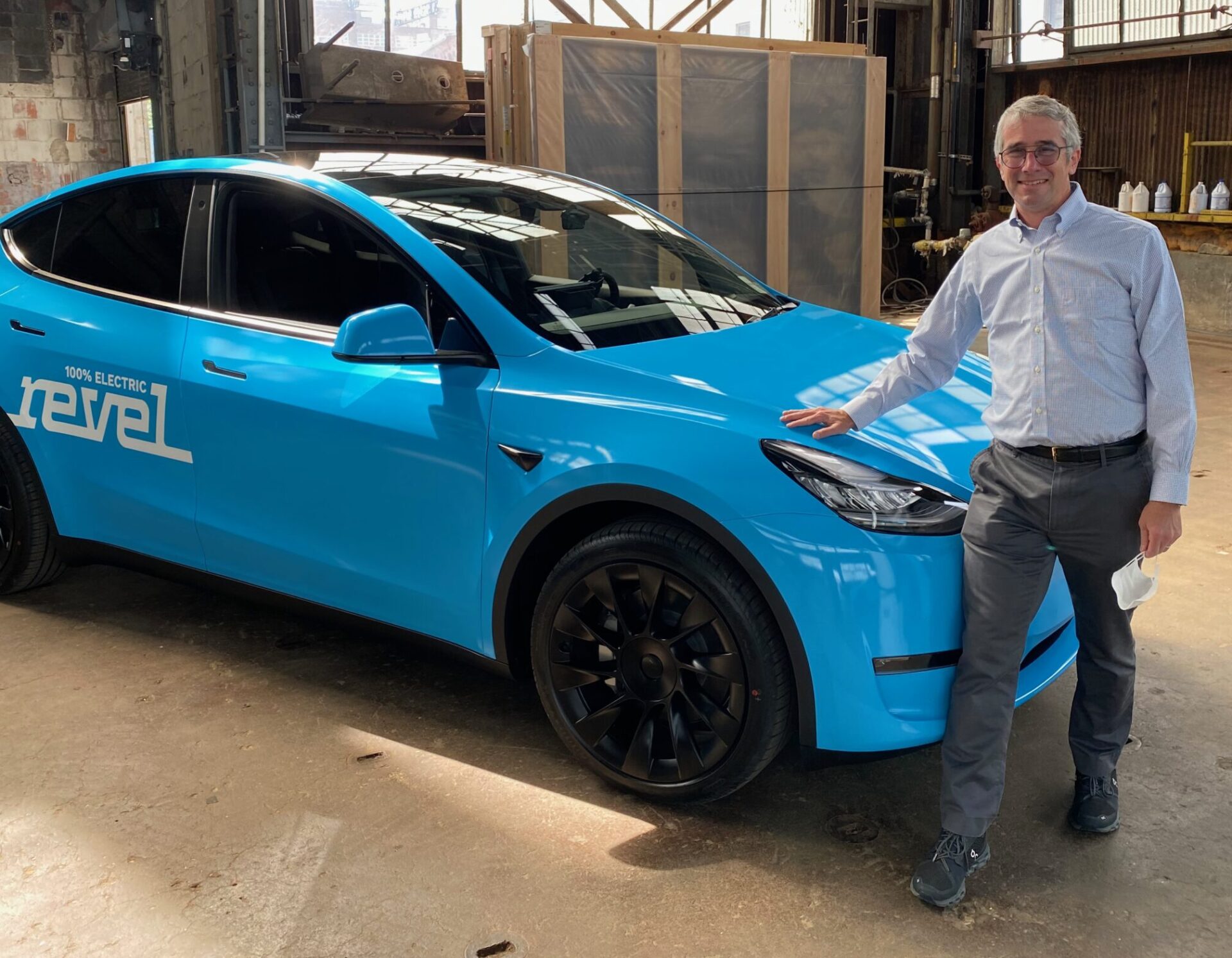
Maniv Mobility
An electric vehicle pioneer drives growth of Mideast transportation startups
Burned years ago in Better Place venture, Michael Granoff’s Israeli fund now helps companies chart future of mobility
TEL AVIV — Michael Granoff, whose $160 million venture capital firm invests in companies that expand the way people get from one place to another, hates driving the family car to work.
Granoff, founder and managing partner of Maniv Mobility, generally commutes to his Tel Aviv office from a northern suburb by train, bus, taxi or riding with a neighbor. For a meeting across town, he’ll hop on one of the motorized rental scooters clustered on city sidewalks.
“I prefer anything than having to sit in traffic and not be productive and be frustrated and then having to park,” Granoff, 53, told The Circuit in a recent interview. “It actually doesn’t cost me more.”
Granoff is not just trying to save money. He’s an evangelist and battle-scarred veteran in the global revolution to widen vehicular choices. To date, Maniv has made investments in 37 companies spread across eight countries. The businesses range from designing sensors in Israel for self-driving cars and running a Tesla ride-sharing service in Manhattan to unleashing electric scooters on the United Arab Emirates.
It’s the Gulf that gets him jazzed these days. Just a week after the UAE and Bahrain signed the Abraham Accords with Israel at the White House on Sept. 15, 2020, Granoff jumped on a plane. He was soon introduced to the founders of Fenix, which runs the Emirati scooter fleet, and made his first investment — $3.8 million — in the company.
“Dubai is becoming a bit of a technology magnet for the Arab world in a similar way that the [San Francisco] Bay Area is, and the government there is committed to nurturing the tech sector and entrepreneurship. I think there will be lots more opportunity over time,” Granoff said.
Granoff grew up in New York City, the son of clothing maker and philanthropist Martin Granoff, who is also a champion horse breeder. Besides inheriting a love for harness racing and Broadway composer Stephen Sondheim, a family friend, young Granoff was fascinated by all kinds of vehicles, particularly the Zamboni truck driven in circles to smooth the ice at skating rinks, according to family lore.
After undergraduate studies at Tufts University, Granoff earned a law degree and an MBA at Northwestern University before returning to New York and opening Maniv Investments LLC, named after the Hebrew word for yield. Among his biggest ventures was Better Place, an ambitious effort in Israel at building a charging network for electric vehicles, or EVs. Founded by charismatic entrepreneur Shai Agassi, the company enchanted investors including Israel’s Idan Ofer, France’s Groupe Renault, HSBC and Morgan Stanley. It burned through $1 billion in capital before going bankrupt in 2013.
Around that time, Granoff moved to Israel with his wife and four children, where he established Maniv Mobility in an effort to find alternatives to gasoline-fueled engines. EV purchases have soared by 70% in Israel over the past year with more than 10,000 new vehicles on the road, Globes reported in June.
Granoff rates the introduction of smartphone apps in 2008 as a historic event for the auto industry — comparable to the Ford Model T a century earlier. Apple’s iPhone “was sort of the beginning of the age of digitizing transportation, which has the effect of making it much more versatile, flexible, cleaner and accessible,” Granoff said.
As President Joe Biden tries to spark the U.S. electric vehicle industry with incentives for manufacturers and car buyers, Granoff broods for a few moments over Better Place’s plight.
“Look, I think the Obama administration missed a golden opportunity in 2009 to do really what Biden has now done, but it could have been done in even a much more dramatic and robust way,” Granoff said. “It was already clear to anybody who was paying attention that the world was moving to electrification,” he said. “We could have been in a position where carbon emissions and… the price of gasoline at the pump… could have been ameliorated with better policy a dozen years ago.”
Maniv has moved on, though, and is involved in all aspects of the EV market. Granoff’s not worried about the fact that electric cars still have trouble finding charging stations. “These are the growing pains of a fast-scaling industry and they’re going to get figured out,” he said.
Granoff’s resilience after Better Place has established him as an important investor today for early-stage mobility companies, said Brian Blum, author of Totaled: The Billion-Dollar Crash of the Startup that Took on Big Auto, Big Oil and The World.
“It was a real blow to have this thing that he believed in so much fall apart,” Blum told The Circuit. “The thing is it didn’t stop him from continuing on his mission of investing in the future of mobility and technology. You know, he just jumped right back into it.”
Among Granoff’s most prominent investments in recent years is Israel’s Otonomo Technologies, which collects data from network-connected vehicles. After going public on the Nasdaq last year through a SPAC (special-purpose acquisition company), Otonomo lost some 80 percent of its value. Saudi Arabia’s Mithaq Capital reported last month that it has amassed a stake of more than 20 percent, making it Otonomo’s biggest shareholder.
In his hometown, Granoff invested in Revel Transit, which is tackling many of the problems that stymied Better Place. The company started by renting mopeds and e-bikes to navigate the traffic-clogged streets of Manhattan. Last year it introduced a ridesharing service that uses a fleet of bright blue-colored Tesla Model Ys to compete with Uber, powered by its own proprietary fast-charging stations.
Phantom Auto, which enables companies to operate driverless forklifts that are steered from remote screens, is another promising startup in Maniv’s stable.
As much as Granoff is determined to develop alternatives to conventional vehicles, he has no illusions about Americans giving up their family cars, especially with 90-minute commutes and the routine need to drive enormous distances.
“Anyone who thinks that car ownership is dead,” he said, “has never had kids or never been to Texas.”


